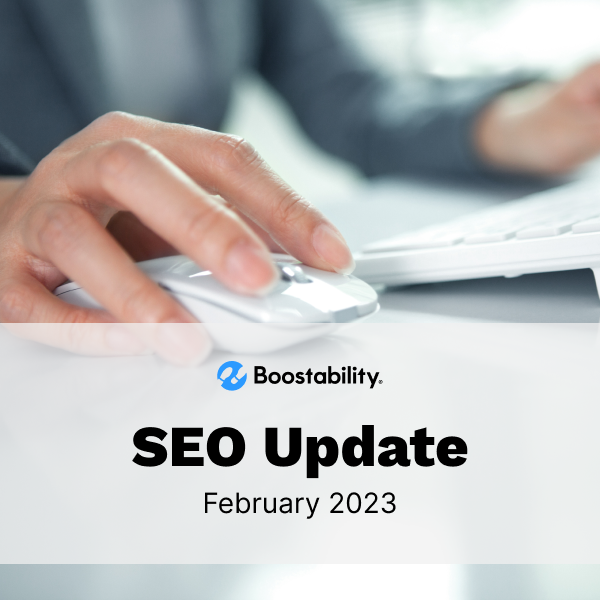
After the news of AI took over all our SEO news to start out the year, things seem to have calmed down just a little. The constant talk and innovation around AI, ChatGPT, content writing, hasn’t changed, but the frantic energy around the conversation has.
Both Google and Bing announced in February more clarification behind how AI will help to deliver search results and change the overall user experience. It’s still a very hot topic, so let’s dive into all things SEO news for February 2023. Because even though it’s the shortest month of the year, we’re definitely not short on news and updates!
The AI Competition Heats Up
New Bing Launched
In our January 2023 SEO Update, we talked about Microsoft’s Bing search engine embracing AI and ChatGPT in a way no one else was, and that it could really change the game. In early February, they announced the integration of OpenAI’s GPT-4 model into Bing, bringing you AI generated search results. This announcement and release brought unprecedented traffic to Bing that hasn’t been seen since its launch over 10 years ago.
While users can use many of these integrated features now, you will need to join the waitlist in order to enjoy the full experience. Likely because Microsoft continues to work out some of the bugs. No word yet on when that full experience will come out in what they’re calling “The New Bing”.
In this instance, you will still see traditional search results. But AI generated results will show up on the right sidebar.
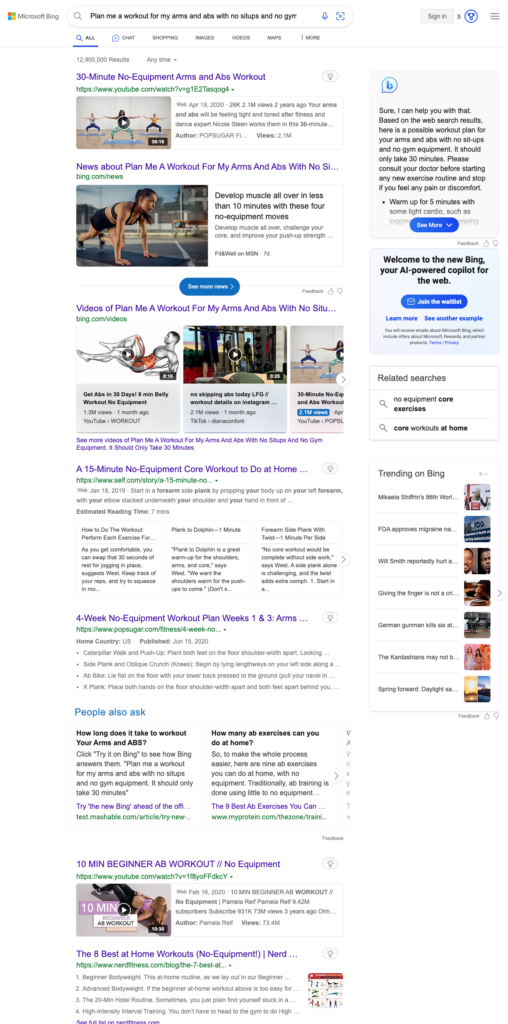
A new version of Microsoft’s Edge Browser (competitor to Google’s Chrome), also launched with AI features built into the sidebar.
Along with all of these new AI features and functions, sometimes they don’t always go as planned. Bing’s AI had a slight meltdown in February.
The new Bing is now going off the rails, insulting users and questioning its own existence. This is fine.
h/t Alec Colehttps://t.co/KYcCwAlixk
— Lily Ray 😏 (@lilyraynyc) February 14, 2023
The ChatGPT-powered AI was sending these messages to its users and appeared to be lying and insulting them. While Bing has seemed to clear up most of these issues, there are still lots of steps that need to be taken to prevent future chaos from happening again.
Google Introduces Bard
With Bing moving full force with ChatGPT, Google immediately felt the pressure to answer. And they did with Bard. Literally the day after Microsoft had its new Bing launch, Google’s CEO announced Bard’s soft launch to trusted testers. They first showed how AI will show up in Google search results.
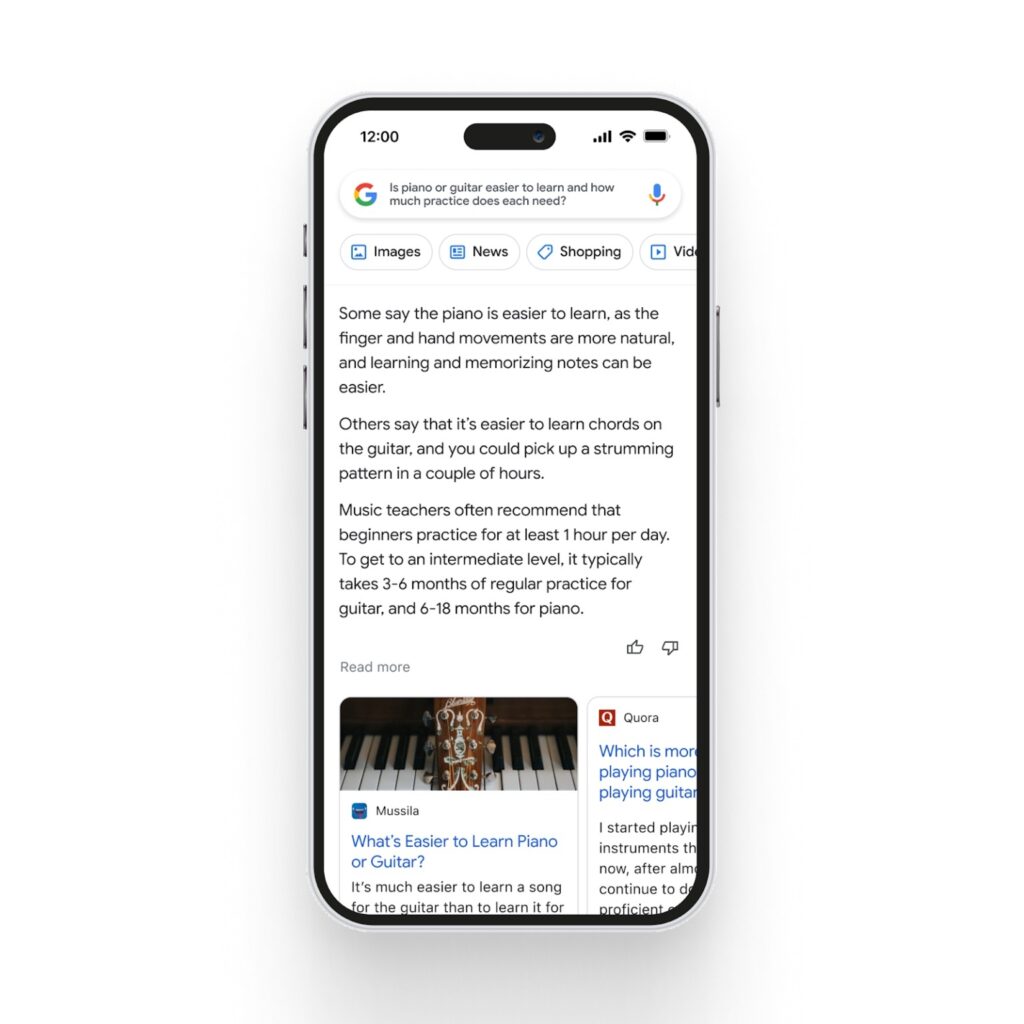
From Google’s CEO Sundar Pichai:
“Soon, you’ll see AI-powered features in Search that distill complex information and multiple perspectives into easy-to-digest formats, so you can quickly understand the big picture and learn more from the web: whether that’s seeking out additional perspectives, like blogs from people who play both piano and guitar, or going deeper on a related topic, like steps to get started as a beginner.”
Bard is designed to be its own tool, like Chat GPT. It will not replace Google search results or the infamous Google algorithm to generate search results. Google also provided this image of what Bard can look like as its own AI service. It’s very similar to Chat GPT in that it has a simple question and answer box. But it’s likely the UI for both these tools will rapidly evolve in the coming months.
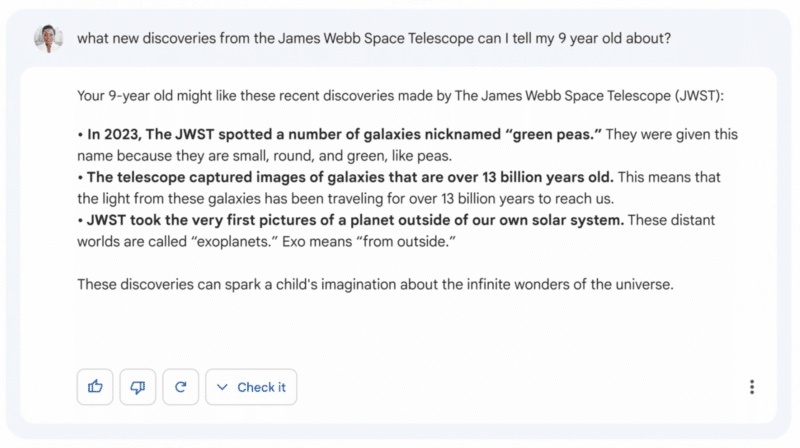
Pichai did emphasize that Bard continues to be experimental. But he’s excited for the future and what it can soon bring to Google search results.
Will We See AI Generated Search Answers?
Google released a statement in early March talking about its approach to AI-generated content showing up in search results. Google has focused for a few years now on good content. High quality content can get a website ranking better than just about anything else. Up until very recently, we didn’t have to worry about if it was an actual person producing that content now going on websites.
Google continues to emphasize quality over quantity with content. Plus new or updated content that demonstrates E-E-A-T, the expertise, experience, authority, and trust. That won’t change. Google’s new term is “people-first” content and guidance on the “who, how, and why” of content. The who being who created the content. The how being if it’s human written or AI written. Google likes transparency. And the why is the purpose behind the content creation and why it’s written to help users. Even if you’re not using AI to help with your content, these guidelines can help you as a guide to writing good content that can rank well.
Google’s policy says that using AI and related tools to generate content “with the primary purpose of manipulating ranking in search results” will violate its spam policies and could get your site blacklisted. That doesn’t mean all AI content is spam. It comes down to the purpose, intent, and the human power behind content. AI can definitely help to supplement content needs. But it doesn’t mean there shouldn’t continue to be a human element to every piece published on a website.
Last Note on AI for This Month
With all these innovations and updates, does it even matter? Do users want AI? Will the way people search and interact with websites change? Popular Youtuber and tech reviewer Marques Brownlee put a poll on his Twitter to his 6 million followers. Over 320,000 people responded, and people said they would rather use Google as it exists now, rather than the AI tools from Bing.
Ok real question. Would you rather use:
— Marques Brownlee (@MKBHD) February 7, 2023
SEO insider Barry Schwarts says he learns from this poll that about 60% of searchers don’t get the benefits of AI in search and how it can improve the search experience. It will remain to be seen how this popular topic changes as the year goes along.
Product Reviews Update
Outside of all this AI talk, Google released the February 2023 Product Reviews Update on the 21st of the month. It caused a lot of ranking volatility for the first few days of its rollout.
Today we released the February 2023 product reviews update, which applies to these languages globally: English, Spanish, German, French, Italian, Vietnamese, Indonesian, Russian, Dutch, Portuguese, Polish. It’ll take ~2 weeks to fully roll out. More here: https://t.co/YpNnK97G3O
— Google Search Central (@googlesearchc) February 21, 2023
Semrush data showed more significance to the February update than the last product reviews updates in July 2022 and September 2022. This data showed 156% more volatility than the previous ones when looking at U.S. desktop search data.
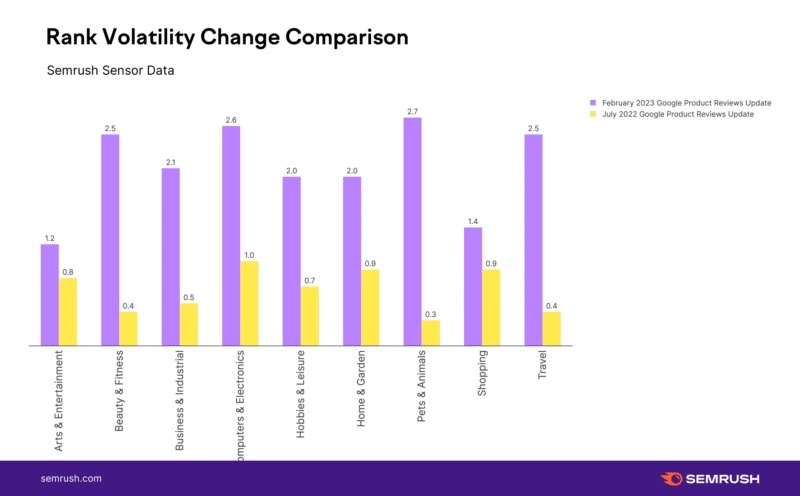
Behind this update, Google wants to promote review content that goes above and beyond what you normally see on the web. Google says it will promote these kinds of unique reviews over others in the rankings. Not that it will punish low-quality reviews, but that reviews with “thin content that simply summarizes a bunch of products.”
If you’ve seen a drop in rankings recently, Google lists two new best practices: more multimedia, and provide more links to multiple sellers.
- “Provide evidence such as visuals, audio, or other links of your own experience with the product, to support your expertise and reinforce the authenticity of your review.
- Include links to multiple sellers to give the reader the option to purchase from their merchant of choice.”
Google Analytics 4 Deadline Coming Soon!
And finally, we feel obligated to bring you this small public service announcement that the Google UA sunset is coming faster than you might realize on July 1st, 2023. If you haven’t started that GA4 migration and setting up proper tracking, it’s time. If you don’t you can risk losing out on your data and the ability to see historic growth. If you’re not sure how to do it, talk to your SEO company or read plenty of articles on the web about the best ways to get started. You won’t regret acting now!

